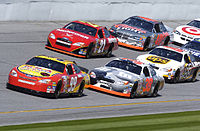
Back Stock car AST Stock car Catalan Stockcar (Amerika) German Stock car Spanish Stock car -kilpailu Finnish Stock-car French Balap mobil stok ID Stock car Italian ストックカー Japanese Stockcar LB
 NASCAR vehicles practicing at Daytona International Speedway with Jeff Burton, Elliott Sadler, Ricky Rudd, Dale Jarrett, and Sterling Marlin in 2004 | |
| Highest governing body | NASCAR |
|---|---|
| Characteristics | |
| Contact | Yes |
| Team members | Yes |
| Type | Outdoor |
| Venue | All types of oval tracks and road courses |
Stock car racing is a form of automobile racing run on oval tracks and road courses. It originally used production-model cars, hence the name "stock car", but is now run using cars specifically built for racing. It originated in the southern United States and later spread to Japan; its largest governing body is NASCAR. Its NASCAR Cup Series is the premier top-level series of professional stock car racing. Canada, Mexico, Brazil, Argentina and Chile also have forms of stock car racing in the Americas. Other countries, such as Australia, New Zealand and the United Kingdom, have forms of stock car racing worldwide as well.[1] Top-level races typically range between 200 and 600 miles (322 and 966 km) in length.
Top-level stock cars exceed 200 mph (322 km/h)[2][3][4] at speedway tracks and on superspeedway tracks such as Daytona International Speedway and Talladega Superspeedway.[5][6] Contemporary NASCAR-spec top-level cars produce maximum power outputs of 860–900 hp[7][8] from their naturally aspirated V8 engines. In October 2007 American race car driver Russ Wicks set a speed record for stock cars in a 2007-season Dodge Charger built to NASCAR specifications by achieving a maximum speed of 244.9 mph (394.1 km/h) at Bonneville Speedway.[9][10] For the 2015 NASCAR Cup Series, power output of the competing cars ranged from 750 to 800 hp (560 to 600 kW).[11][12]
- ^ "Stock Car - Corridas, Torneio, Pilotos, Carros e mais". www.stockcar.com.br. Archived from the original on 8 March 2018. Retrieved 4 May 2018.
- ^ "Teams push 217-plus mph at Michigan test". Archived from the original on 4 March 2016. Retrieved 17 April 2016.
- ^ "Kevin Harvick records second-fastest qualifying speed in NASCAR history — and does it twice at Michigan". MotorSportsTalk. 13 June 2014. Archived from the original on 17 March 2016. Retrieved 17 April 2016.
- ^ "NASCAR Racing Breaking News: Trackside Live, Every Week, Every Sprint Cup Race - MikeMulhern.net". Archived from the original on 4 March 2016. Retrieved 17 April 2016.
- ^ Tom Jensen. "Year of speed: NASCAR teams go faster than ever before". FOX Sports. Archived from the original on 28 November 2015. Retrieved 17 April 2016.
- ^ Jeff Owens. "Dale Earnhardt Jr. tops 215 mph as speeds soar during Michigan test". Sporting News. Archived from the original on 20 April 2016. Retrieved 17 April 2016.
- ^ Tom Jensen. "EXCLUSIVE: NASCAR considering horsepower reduction in 2015". FOX Sports. Archived from the original on 2 September 2016. Retrieved 17 April 2016.
- ^ "NASCAR Engine Rules - How NASCAR Engines Work - HowStuffWorks". HowStuffWorks. 29 December 2008. Archived from the original on 19 April 2016. Retrieved 17 April 2016.
- ^ "Autodesk - Press Room Archive - American 'Speedking' Russ Wicks Sets New World Speed Record". 17 October 2007. Archived from the original on 4 March 2016. Retrieved 17 April 2016.
- ^ K&N Engineering, Inc. "Speedking Russ Wicks Sets Newest World Stock Car Speed Record at Bonneville". Archived from the original on 25 November 2015. Retrieved 17 April 2016.
- ^ "NASCAR reportedly considering Sprint Cup engine horsepower reduction in 2015". MotorSportsTalk. 23 March 2014. Archived from the original on 2 May 2016. Retrieved 17 April 2016.
- ^ Bruce, Kenny (September 23, 2014). "Horsepower reduction among 2015 rules package changes". NASCAR. Archived from the original on 2016-02-26. Retrieved 2016-02-21.